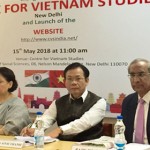These remarks were given by Rajiv Bhatia, Distinguished Fellow, Foreign Policy Studies, Gateway House as chair of the Inauguration of the Centre for Vietnam Studies in New Delhi on May 15, 2018
- This Centre can be a trailblazer, even though it has been established four years later than its counterpart i.e. the Centre for India Studies in Vietnam. It needs to focus attention on Vietnam-India relations in a broad context, covering bilateral, sub-regional, regional and international (i.e. Indo-Pacific) facets. Essentially, its approach should be global and multi-sectoral.
- A key role envisaged for the Centre is to serve as a platform for interaction between experience and youth. It will invest in grooming young scholars with the guidance and assistance of established domain experts.
- As a new institution, it should be ready to struggle in order to balance its vision and ambition with limited resources. Corporates, with stakes in India-Vietnam relations, would do well to support the Centre as a useful and long-term investment.
- It may be advisable to accord some priority to the sub-regional aspects, as Vietnam is the natural leader of CLMV countries. In particular, Mekong-Ganga Cooperation and BIMSTEC should be studied by our scholars.
- Why BIMSTEC (since Vietnam is not its member)? The reason is two-fold. Firstly, the Trilateral Highway Project linking India, Myanmar and Thailand will eventually be extended to Vietnam, Cambodia and Laos. Secondly, a recent study by FICCI has envisaged incorporating Vietnam, Cambodia and Laos as Observers in BIMSTEC – and later as members.
- The Advisory Council should hold its meetings periodically, perhaps once in a quarter initially. It should adopt an inclusive approach, meaning that it should consult other stakeholders as widely as possible in devising its action plan.
- It may be worthwhile for the Centre to enter into MoUs with relevant and interested organisations (such as the Kalinga International Foundation).
- The Centre will strive to organise an exchange of scholars, and especially visits of Indian experts (including members of the Advisory Council) to Vietnam, whenever feasible.
- This institution has a promising future, provided the remarkable synergy that brought it into existence is sustained, thus enabling it to flourish in the future.
Rajiv Bhatia is Distinguished Fellow, Foreign Policy Studies, Gateway House
This speech was delivered at the Inauguration of the Centre for Vietnam Studies in New Delhi on May 15, 2018
For interview requests with the author, or for permission to republish, please contact outreach@gatewayhouse.in.
© Copyright 2018 Gateway House: Indian Council on Global Relations. All rights reserved. Any unauthorized copying or reproduction is strictly prohibited


